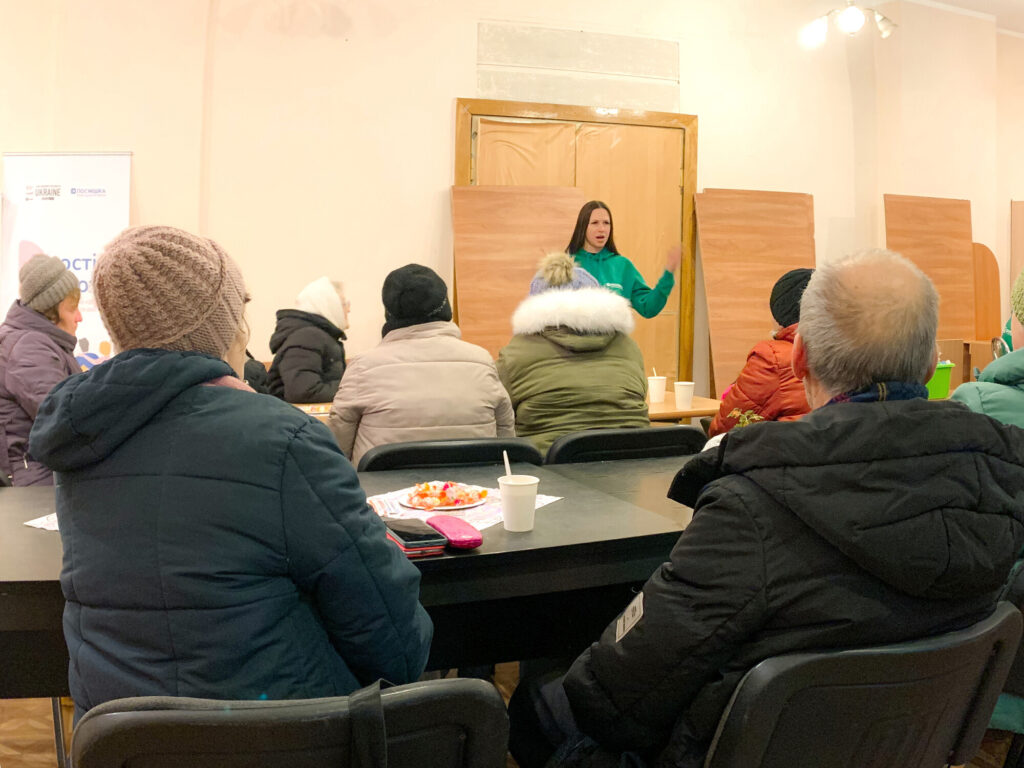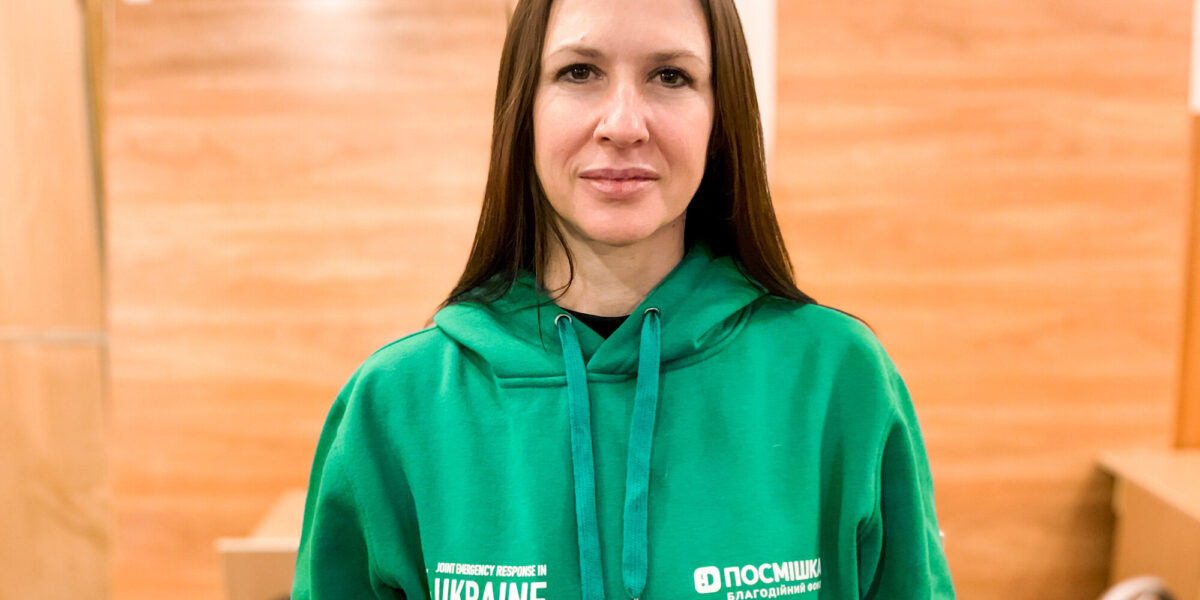By Olivia Giovetti, Concern Worldwide
The 45th wedding anniversary is traditionally regarded as the sapphire anniversary, a gemstone associated with peace and prosperity. For Olek and Veronika*, their own 45th anniversary should have been a celebration of as much. It had been hard won.
They originally met and fell in love in the eastern Ukrainian city of Zaporizhzhia. They have returned, but not to celebrate their landmark anniversary or in circumstances they could have imagined.

I met them in March as they sat in the basement of a university building in the city at a psychosocial support meeting. The Joint Emergency Response in Ukraine (JERU) supported the programme, operated by Alliance2015 members Welthungerhilfe, Cesvi and Concern Worldwide. A local Ukrainian NGO partner, Posmishka, provided the service.
The building has been re-purposed as a community centre to meet the needs of some of the millions of Ukrainians displaced by war. Olek and Veronika have started coming here to attend a weekly support group for older people, either displaced or affected by the violence that has reached this city of about 750,000.
Whatever comforts they may have found in returning to a familiar place have been obliterated by the traumas of the last year and the uncertainty that lies ahead.
The couple originally lived in Zaporizhzhia. Veronika drove a tram. Olek was a driver for an orphanage. “A difficult place to work. Most people couldn’t stay there for a long period of time, but my husband worked there for many years,” says Veronika, patting her husband’s hand with pride.
Despite running into each other from time to time, Olek, who is now 70 and has soulful eyes but a reserved expression, had been too shy to talk to Veronika (now 65). At the wedding of mutual friends, he was finally able to break the ice — with the help of a ram. Having been tasked with receiving the couple’s gifts, the two were baffled when one guest brought the animal.
“We were standing together saying, ‘Why would you bring this huge ram to a wedding?!’” Someone saw the pair laughing and said, “You will get married next!” In February of 1978, they did just that, moving to the city of Polohy, raising two children, and building a life together.
This isn’t a unique situation, especially for people who, like Olek and Veronika, were born during a chaotic moment of history in Ukraine: For their parents, the Holomodor famine of the 1930s and the ravages of World War II were fresh scars. They were raising young families of their own when the Soviet Union collapsed, and Ukraine gained independence, setting off nearly a decade of cataclysmic inflation and entering the new millennium in an era of political instability and corruption.
In context, while the last year has brought unimaginable and visceral horror to millions’ doorsteps, it’s only the latest salvo for a fraught generation.
Many have had personal traumas to contend with during this time as well. In 2007, Veronika sustained several injuries in an accident, including a broken jaw and multiple arm fractures. Some doctors didn’t expect her to survive. Others expected she would be paralyzed for at least five years.
“But I told them it would not be like that,” says Veronika, a steely glint in her eye. She found a post-trauma clinic in Kharkiv, roughly six hours away by car, that she visited twice a year and learned how to walk again.
At that time, however, Olek also had a series of strokes that forced Veronika to put her own recovery on hold to help her husband.
Now in the early stages of dementia, Olek doesn’t speak throughout our nearly hour-long conversation, but in hearing his wife recount this part of their story and remembering that time, he begins to cry.
Ultimately, however, the couple saw the experience as their chance to regain their lives and their health. “The doctors at the rehabilitation centre said to me, ‘Your time on earth is not over. You are still needed here,’” Veronika says.

As they approached their 45th anniversary, Olek and Veronika should have been in a place where they could bask in the prosperity of the life they built together. They ought to be enjoying country life at their dacha, going to book club meetings at their community centre in Polohy, or seeing their four grandsons.
But the eruption of the conflict denied them this. “We didn’t believe it at first,” says Veronika of the February 24 invasion. “Nobody believed this was really happening.”
Nor did they think it would move so quickly at first, only to lapse into protracted violence.
On March 3, 2022, Russian forces reached Polohy. As the couple watched tanks roll down their street, they also worried about the knock-on effects of the invasion: Olek’s health problems returned, and they were unable to get his medications. Without them, his legs swelled — making the frequent trips up and down the stairs to their local bomb shelter even more difficult.
His dementia was also starting to progress, and doctors warned that he could die.
As Russian forces went door-to-door, performing what Veronika euphemistically calls a “cleansing” of their neighbourhood, she begged her husband to stay in bed. “But he couldn’t do that,” she says, her voice starting to break.
“At one point, I looked out my window and saw a Russian soldier pointing a gun directly towards me,” she adds. “He said, ‘Don’t say a word, or I’ll shoot.’ I was so scared, and I couldn’t move.” Eventually, the soldier left.
As she tells me all of this, Veronika looks from time to time at Lilia, the psychologist who works with Posmishka. Lilia nods supportively. Veronika adds she doesn’t think she would be able to tell this story without the help she and Olek have found in this group.
With 20 years of experience as a psychologist, Lilia has been able to adapt her expertise to the current needs in eastern Ukraine. While the conflict may dip in and out of international headlines, she notes that millions are still living in a constant state of stress, the psychological vicissitudes of war.
“The main challenge now is that people haven’t adjusted to the circumstances that they’re now facing,” she explains. “Even after a year.”
This remains one of the under-documented effects of conflict but can carry significant impacts.
The World Health Organisation estimates that, over the last decade, one out of every five people who have experienced war or other forms of armed conflict will face depression, anxiety, Post Traumatic Stress Disorder, bipolar disorder, or schizophrenia. Applying this to Ukraine would leave an estimated 9.6 million in need of psychosocial support.
For pensioners like Veronika and Olek, the country’s inflation rates leave them unable to afford even the basics. In the last year, they’ve watched the life they built together erode at a horrifying pace.
And while the material needs are undeniable, Lilia adds that the mental toll so much uncertainty and need takes on a person cannot be ignored. Without being able to end the airstrikes or fix the economy, she says two of the best tools for Ukrainians across the country are awareness and self-regulation.
“We cannot completely eliminate this state of high anxiety, but over time we can learn to handle it physiologically,” she notes.
Lilia adds that the path towards psychological recovery will continue even when the war ends. But — like water, roads, and electricity — it’s an essential infrastructure.

Veronika and Olek’s experience with Posmishka hasn’t solved everything. But it’s provided some much-needed community amid the chaos. Veronika recalls not only the practical techniques they’ve learned — psychological as well as some physiotherapy exercises for Olek’s legs — but the emotional relief from joining this group: “We were met with very friendly faces here.”
The couple considers themselves lucky, as well: They were able to ask for help, one of the biggest barriers that Posmishka sees in reaching more Ukrainians with psychosocial first aid. “I think many people still need this, but are very shy. They can’t come and say, ‘I need help,’” Veronika adds.
These are indeed three small but challenging words to say, but they’ve become an essential step for the couple to move back towards peace and prosperity. Veronika is emphatic: “We needed this.”
*Names changed to protect individuals for security reasons.


